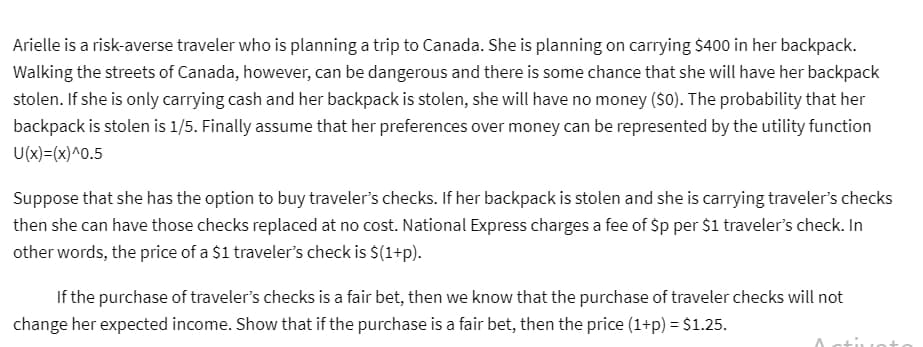Arielle is a risk-averse traveler who is planning a trip to Canada. She is planning on carrying $400 in her backpack. Walking the streets of Canada, however, can be dangerous and there is some chance that she will have her backpack stolen. If she is only carrying cash and her backpack is stolen, she will have no money ($0). The probability that her backpack is stolen is 1/5. Finally assume that her preferences over money can be represented by the utility function U(x)=(x)^0.5 Suppose that she has the option to buy traveler's checks. If her backpack is stolen and she is carrying traveler's checks then she can have those checks replaced at no cost. National Express charges a fee of $p per $1 traveler's check. In other words, the price of a $1 traveler's check is $(1+p). If the purchase of traveler's checks is a fair bet, then we know that the purchase of traveler checks will not change her expected income. Show that if the purchase is a fair bet, then the price (1+p) = $1.25.
Arielle is a risk-averse traveler who is planning a trip to Canada. She is planning on carrying $400 in her backpack. Walking the streets of Canada, however, can be dangerous and there is some chance that she will have her backpack stolen. If she is only carrying cash and her backpack is stolen, she will have no money ($0). The probability that her backpack is stolen is 1/5. Finally assume that her preferences over money can be represented by the utility function U(x)=(x)^0.5 Suppose that she has the option to buy traveler's checks. If her backpack is stolen and she is carrying traveler's checks then she can have those checks replaced at no cost. National Express charges a fee of $p per $1 traveler's check. In other words, the price of a $1 traveler's check is $(1+p). If the purchase of traveler's checks is a fair bet, then we know that the purchase of traveler checks will not change her expected income. Show that if the purchase is a fair bet, then the price (1+p) = $1.25.
Managerial Economics: A Problem Solving Approach
5th Edition
ISBN:9781337106665
Author:Luke M. Froeb, Brian T. McCann, Michael R. Ward, Mike Shor
Publisher:Luke M. Froeb, Brian T. McCann, Michael R. Ward, Mike Shor
Chapter17: Making Decisions With Uncertainty
Section: Chapter Questions
Problem 17.5IP
Related questions
Question

Transcribed Image Text:Arielle is a risk-averse traveler who is planning a trip to Canada. She is planning on carrying $400 in her backpack.
Walking the streets of Canada, however, can be dangerous and there is some chance that she will have her backpack
stolen. If she is only carrying cash and her backpack is stolen, she will have no money ($0). The probability that her
backpack is stolen is 1/5. Finally assume that her preferences over money can be represented by the utility function
U(x)=(x)^0.5
Suppose that she has the option to buy traveler's checks. If her backpack is stolen and she is carrying traveler's checks
then she can have those checks replaced at no cost. National Express charges a fee of Sp per $1 traveler's check. In
other words, the price of a $1 traveler's check is $(1+p).
If the purchase of traveler's checks is a fair bet, then we know that the purchase of traveler checks will not
change her expected income. Show that if the purchase is a fair bet, then the price (1+p) = $1.25.
Expert Solution
This question has been solved!
Explore an expertly crafted, step-by-step solution for a thorough understanding of key concepts.
Step by step
Solved in 3 steps

Knowledge Booster
Learn more about
Need a deep-dive on the concept behind this application? Look no further. Learn more about this topic, economics and related others by exploring similar questions and additional content below.Recommended textbooks for you

Managerial Economics: A Problem Solving Approach
Economics
ISBN:
9781337106665
Author:
Luke M. Froeb, Brian T. McCann, Michael R. Ward, Mike Shor
Publisher:
Cengage Learning


Managerial Economics: A Problem Solving Approach
Economics
ISBN:
9781337106665
Author:
Luke M. Froeb, Brian T. McCann, Michael R. Ward, Mike Shor
Publisher:
Cengage Learning
